by M. C. Jennings | Oct 19, 2023 | Academics, Careers In..., COBA Faculty, COBA Staff, College Decisions, Computer Science, Current Students, Faith Infusion, School of Information Technology and Computing, Student Spotlights
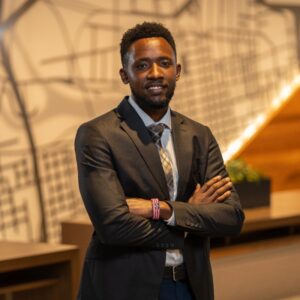 written by special contributor Lance Fleming
written by special contributor Lance Fleming
Fabrice Mpozenzi spent his summer internship working for JP Morgan Chase in Wilmington, Delaware, where he had the opportunity to get in on the ground floor of working on the front end and back end of web applications and other projects meant to further his understanding of the business.
The junior computer science major from Rwanda also worked on a business with a team of interns, which was eventually presented to senior executives for implementation. Mpozenzi’s internship fueled his desire to work as a software engineer after he graduates from ACU.
We recently caught up with Mpozenzi to get his insights on his summer internship and how ACU prepared him to work with JP Morgan Chase.
Q: What did you do in your internship?
Mpozenzi: “I had a chance to work on several different projects. I worked on a web application’s front and back end and presented it to a team of engineers, including my manager. I also had an opportunity to collaborate with other interns to work on a business plan project that we presented to senior executives.”
Q: What was your favorite part of the internship?
Mpozenzi: “What I loved most about my internship was the opportunity to shadow other teams to see the projects they were working on and learn from them. I also loved networking with different people at the company.”
Q: What are the most significant lessons you learned in your internship?
Mpozenzi: “The internship taught me two things: learning is a journey that never ends because there’s always going to be something new to learn, and one must stay hungry and motivated to learn new skills. I also learned that asking questions, especially in the workplace, is an art that unlocks knowledge and fosters a deeper understanding.”
Q: How do you see this experience aiding you in the future?
Mpozenzi: “It’s given me a roadmap to an industry that I would like to contribute to in the future, and I made connections with people from diverse backgrounds that I believe are going to be helpful in my future endeavors.”
Q: What are your plans after graduation?
Mpozenzi: “I plan to work with a Fintech company as a software engineer.”
Q: Do you have any tips for future interns or students looking for internships?
Mpozenzi: “I would tell students looking for internships to stay proactive and seek support from the professional development team. Also, stay informed about your industry, and once you secure an internship, make the most of the experience by learning and networking.”
Q: How has your time at ACU prepared you for this internship, employment, or graduate school after graduation?
Mpozenzi: “The academic coursework at ACU has equipped me with a solid foundation of knowledge and problem-solving skills relevant to my field. ACU’s professional development services, including resume workshops and interview coaching, have also helped me refine my professional presentation. These resources have prepared me for this internship and laid the groundwork for my post-graduation plans.”
Q: What’s been your most memorable experience as a business or technology student at ACU?
Mpozenzi: “My favorite thing about being a technology student at ACU is the supportive faculty and the vibrant student community that has created an environment where I can collaborate and engage in meaningful discussions with peers. ACU’s commitment to fostering a strong community has enriched my academic experience.”
by M. C. Jennings | May 26, 2023 | COBA Faculty, College Decisions, Current Students, School of Information Technology and Computing, Student Spotlights, Uncategorized
Written by special contributor Lance Fleming
Each day, students across the ACU campus display the university’s mission to educate students for Christian service and leadership throughout the world through their actions and acts of service on the campus. Each year, students like those are nominated by their academic departments. From those nominations, 50 scholars are selected by the ACU Faculty Senate to receive the University Scholars Award for their graduating class.
Among those 50 scholars who demonstrated outstanding scholarship by maintaining a grade point average (GPA) of 3.5 or higher, earning 90 hours towards their degree, and continuing the pursuit of knowledge in their research field, seven are students from the College of Business Administration. The COBA students who received this year’s University Scholars Award are Kathryn Crawford, Gracie Isham, Matthew Roberson, Will Harris, Diego Lozano Welsh, Ben Blackmon, and Garrett Powell.
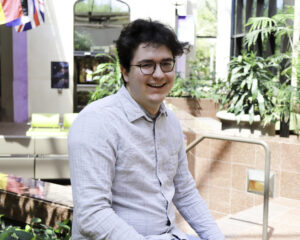 We have been highlighting each of those seven individuals over the last few weeks, including this profile of Ben Blackmon. A native of Allen, Texas, Ben recently graduated from ACU with a degree in Digital Entertainment Technology (DET) and a minor in Bible. He will be attending Guildhall SMU in the fall, a graduate program designed for video game development where he will be part of the level design track.
We have been highlighting each of those seven individuals over the last few weeks, including this profile of Ben Blackmon. A native of Allen, Texas, Ben recently graduated from ACU with a degree in Digital Entertainment Technology (DET) and a minor in Bible. He will be attending Guildhall SMU in the fall, a graduate program designed for video game development where he will be part of the level design track.
Ben has also been involved with SIGCHI, the leading organization for students and professionals interested in studying human-computer interaction. He also led the DET club this year as president.
Ben recently answered a few questions about his time at ACU and in COBA, covering everything from his most influential class to the most impactful experience he’s had while at ACU:
Q: What is the most important thing you’ve learned about yourself at ACU?
Blackmon: “The most important thing I’ve learned at ACU is that life isn’t about me. When you stop and consider the lives of everyone around you and how they are all experiencing life alongside you, it helps put things into perspective in a way that I hadn’t had previously. Even though I entered college knowing that life isn’t about me, it wasn’t until I grew up and matured that my life started to reflect that belief.”
Q: What professor or class has impacted you most and why?
Blackmon: “I think of all of the Professors that have impacted me, the most impactful has been Professor Rich Tanner. He was an excellent mentor and teacher, but he was a good friend when things became tough this semester. He has consistently been there for his students and has been there for us throughout all of our time here.”
Q: Of all the things you’ve experienced at ACU, what do you believe will have the most impact on your life?
Blackmon: “The most influential part of being a part of COBA is the staff. I know all of the SITC staff with whom I have had classes personally, and they have helped me grow tremendously. Even beyond that, for the one class I had with Dr. Andy Little for BLAW, he helped me when I struggled in his class. I have never been surrounded by a staff that has been so supportive, helpful, and instrumental to my growth at ACU.”
by M. C. Jennings | May 3, 2023 | Academics, Current Students, Faith Infusion, Research, School of Information Technology and Computing, Student Spotlights, Uncategorized
Written by special contributor Lance Fleming
Each day, students across the ACU campus display the university’s mission to educate students for Christian service and leadership throughout the world through their actions and acts of service on the campus. Each year, students like those are nominated by their academic departments. From those nominations, 50 scholars are selected by the ACU Faculty Senate to receive the University Scholars Award for their graduating class.
Among those 50 scholars who demonstrated outstanding scholarship by maintaining a grade point average (GPA) of 3.5 or higher, earning 90 hours towards their degree, and continuing the pursuit of knowledge in their research field, seven are students from the College of Business Administration. The COBA students who received this year’s University Scholars Award are Kathryn Crawford, Gracie Isham, Matthew Roberson, Will Harris, Diego Lozano Welsh, Ben Blackmon, and Garrett Powell.
We will highlight each of the seven over the next month, including this profile of Garrett Powell, a native of Aledo, Texas, who carries a 3.9 GPA while majoring in computer science with a focus on software engineering and minoring in mathematics. Garrett – who has been working as an intern for Funeral Directors Life Insurance Company – will go to work with FCLIC as a DevOps Developer.
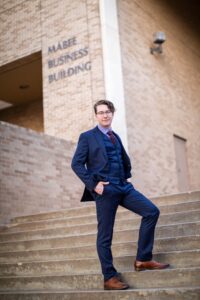 While at ACU, Garrett has been heavily involved in academic and campus life pursuits. He has served as Dr. James Prather’s research assistant, researching metacognition, programming error messages, and novice programmers. Seven of his articles have been published on various platforms over the last three years.
While at ACU, Garrett has been heavily involved in academic and campus life pursuits. He has served as Dr. James Prather’s research assistant, researching metacognition, programming error messages, and novice programmers. Seven of his articles have been published on various platforms over the last three years.
He’s also the chairman of the local ACM SIGCHI Chapter and is president of the ACU Swing Cats, the swing dance club on campus. Garrett has been with the group since the fall of his freshman year (2019-20) and was with the group on April 29 when it celebrated its 20th anniversary with a dance at the Elks Ballroom.
Garrett recently answered a few questions about his time at ACU and in COBA, covering everything from his most influential class and professor to the most impactful thing he’s been a part of while at ACU:
Q: What is the most important thing you’ve learned about yourself at ACU?
Powell: “Learning to interact and communicate with people from different areas of life, whether from other majors or societal backgrounds.”
Q: What professor or class has impacted you most and why?
Powell: “James Prather has by far been the most influential professor. He picked me up as a research assistant in the spring of my freshman year and has been a mentor ever since. He introduced me to the many ways we can improve people’s lives by implementing accessibility tools on our software. The most influential class would have actually had to have been a two-part class. Software 1 and 2, taught by Brent Reeves, greatly impacted me. He helped implement projects that reflected what working in the real world was like. It did a great job preparing me for what I see in my job day to day.”
Q: Of all the things you’ve experienced at ACU, what do you believe will have the most impact on your life?
Powell: “Being involved in Swing Cats has been the most influential part of my college experience. It brought me out of my comfort zone and moved me into a leadership position.”
by M. C. Jennings | Oct 20, 2022 | Academics, Accounting, Alumni Spotlight, COBA Faculty, COBA Staff, Current Students, Digital Entertainment Technology, Financial Management, Human Resource Management, Management, Management Information Systems, Marketing, Placement stories, Professional Development, School of Information Technology and Computing, Uncategorized
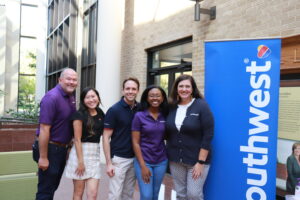
COBA Alums who work at Southwest Airlines recently came to discuss internship opportunities at the company with COBA students. Pictured from left to right are Chris Grubbs (’95), Kristy Ng (’20), Baron Smith (’09), Bethani Culpepper (’19), and Katie Coldwell (’00).
Written by special contributor Lance Fleming
When the College of Business Administration (COBA) unveiled the most significant changes to its curricula in decades, one area of great emphasis was professional development. Those studying the updates and later making the recommendations believed a professional internship would help make COBA students more well-rounded prospective employees when they left ACU.
As Dr. Brad Crisp, the Dean of the College of Business Administration said recently, “… we are placing greater emphasis on professional development by requiring a professional internship in management, marketing, and information systems and offering an internship as an option for accounting and finance majors.”
As the person serving as the director of professional development and internships for COBA, Jasmine McCabe-Gossett said the new emphasis on internships will help make students better equipped to handle real-world practices that they will face when they begin working full-time.
“Students need to take advantage of the unique timing internships can offer,” said McCabe-Gossett, who is in her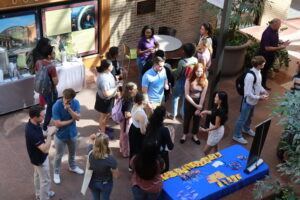 first year as the Professional Development and Internship Director for COBA. “Students have the distinct opportunity to apply what can feel like abstract theories and case studies to the real world. Internships are insulated and allow students to practice in an environment designed for them to ask questions and fail, whereas, post-graduate opportunities can be far less forgiving.”
first year as the Professional Development and Internship Director for COBA. “Students have the distinct opportunity to apply what can feel like abstract theories and case studies to the real world. Internships are insulated and allow students to practice in an environment designed for them to ask questions and fail, whereas, post-graduate opportunities can be far less forgiving.”
Tim Johnston, the Assistant Dean for COBA, said a student who participates in an internship program in college will have a distinct advantage over students who don’t take advantage of those programs.
“Many years ago, with the contraction of the economy, many students were entering college without a lot of summer work experience,” Johnston said. “One of the top qualities all employers like to access is work ethic. Without a lot of work experience, it was difficult to feel confident about a student’s ability to dig-in and work hard. Many large organizations started internship programs.
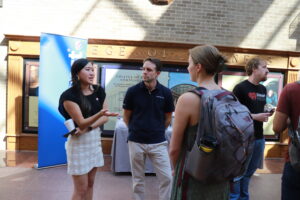
“These programs typically run for 12 weeks during the summer,” he said. “Most are paid and it’s a way for a company to have a long and intense look at the candidates. Many companies only offer full-time opportunities to those students who have completed an internship with their organization. So for many large firms, this is the path into their company.”
When a student is looking for an internship, COBA Associate Dean Andy Little said one thing stands above all when he advises a student on a potential position.
“Fit,” he said succinctly. “In other words, does this organization fit your values and the goals you have set for yourself? Will you get practical experience? What kind of people work there? Is it an industry or market segment that you would like to start your career in?”
McCabe-Gossett agrees that finding an internship in a potential career field is an essential part of finding the right landing spot.
“I encourage students to focus on finding an internship in the industry they imagine as their future career,” she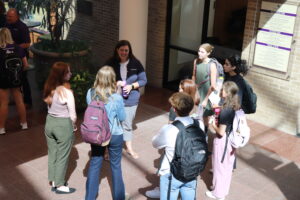 said. “Doing so will allow them to fully immerse themselves so they can determine whether or not their dream industry aligns with their values, work style, etc.”
said. “Doing so will allow them to fully immerse themselves so they can determine whether or not their dream industry aligns with their values, work style, etc.”
The National Association of Colleges and Employers has surveyed employers and determined the following qualities are most important to the potential employers surveyed. In order of importance, those qualities are:
- Problem-solving (critical thinking)
- Teamwork / collaboration
- Professionalism / work ethic
- Verbal and written communication skills
- Digital technology capabilities
- Leadership
- Global / multicultural fluency
“We want our students to demonstrate these competencies and reflect on their current areas of strength and areas where growth is needed,” Johnston said. “Their internship manager completes a formal evaluation that provides feedback on these key qualities.
“Another key advantage we are looking to provide for ACU students is an opportunity to intern with ACU alumni,” he said. “Our alumni teach students how professional excellence provides another avenue to honor God, as we serve in the marketplace.”
If you’d like to know more about internships with COBA, as either an employer or a student, email coba@acu.edu.
by M. C. Jennings | Aug 31, 2022 | Academics, Current Students, Digital Entertainment Technology, Faith Infusion, School of Information Technology and Computing, Student Spotlights, Uncategorized
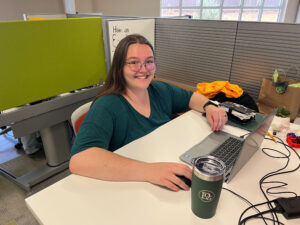 Written by special contributor Lance Fleming
Written by special contributor Lance Fleming
In most places of business, an apprentice is given a few days or even a week to get their feet wet and learn the ins and outs of the office before being fully indoctrinated into the ins and outs of the everyday job.
Alissa Davis didn’t have that luxury.
When Davis – who is pursuing her Bachelor of Science in Digital Entertainment Technology (DET) with an emphasis on Video Game Design and is on target to graduate in May 2023 – started her apprenticeship with Funeral Director’s Life Insurance Company on June 1, she had no choice but to get right to work and help her co-workers make it through one of the saddest moments in the recent history of the country.
Just one week before she began, 19 students and two teachers at Robb Elementary School in Uvalde lost their lives to a mass shooter. When Davis began her apprenticeship, she was immediately charged with helping to set up and monitor live streams of approximately 15 of the funerals that stretched over several days.
It was a tough and emotional task and one that Davis hasn’t fully put into perspective.
“I still haven’t fully processed the emotions that came with it,” said Davis, who is a senior from Stephenville. “There were several times during the services when I had to completely turn the sound off and momentarily step away from my desk where I was monitoring the live stream because I couldn’t handle the sound of the parents grieving for their lost children. There was always a tense aura in the department because we needed to do better than our best and ensure that everything went as smoothly as possible for those families and the community, who suffered great losses.”
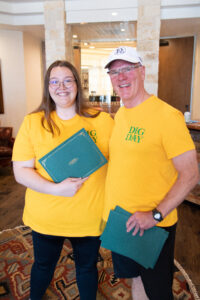 Around July 1 when her boss returned from Uvalde, Davis was assigned a new responsibility to create short training videos for both new and regular clients to watch and learn how to use the FDLIC streaming product. Despite the difficult and emotional circumstances, Davis had quickly made a name for herself at the company. So much so that at the end of her apprenticeship, Davis was awarded the Performance Plus Award, which is awarded by the FDLIC’s Board of Directors and had never before been presented to an apprentice.
Around July 1 when her boss returned from Uvalde, Davis was assigned a new responsibility to create short training videos for both new and regular clients to watch and learn how to use the FDLIC streaming product. Despite the difficult and emotional circumstances, Davis had quickly made a name for herself at the company. So much so that at the end of her apprenticeship, Davis was awarded the Performance Plus Award, which is awarded by the FDLIC’s Board of Directors and had never before been presented to an apprentice.
The award is given to an employee who shows outstanding qualities that fit several of the 22 non-negotiable traits of the company. Normally, the person who receives the award is recognized by another respected employee of the company and awarded at a company-wide meeting at the end of the month. However, Davis’s above-and-beyond effort resulted in her receiving this remarkable reward.
“I was stunned,” Davis said of the moment when she was announced as the winner of the award. “I knew that I helped the team, but I discredited myself as able to receive praise because I never went there personally or interacted with the people in person as the rest of the team did. So, when it came time to recognize the winners, I was completely stunned to see my name there.”
By the end of her second week, Davis said, she was fully trained and up to speed on almost everything a normal employee in the FDLIC Encore Department would know. The Encore Department is the technology used to live-stream funeral services.
“I had to quickly learn how to do so much more than an ordinary apprentice should in less than one week,” Davis said. “By my third day, I took on responsibilities as if I was another full-time employee because I wanted to do anything I could to help make the lives of my bosses and co-workers easier. They needed to put their focus and full attention on the devastating matter at hand and give the funeral directors on site their undivided attention and assistance.”
Davis – who said the greatest lesson she learned during her apprenticeship is that it’s OK to make mistakes –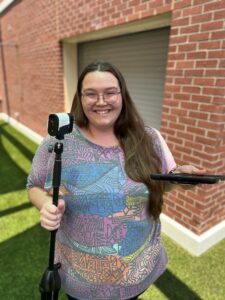 was on the job for two months and will have a full-time job waiting for her when she graduates. In the meantime, she was offered a part-time job when the apprenticeship was over and she’s currently working in that job until she can begin her full-time job. And after some time there, her goal is to pursue a career with her DET degree because her true passion is video game design.
was on the job for two months and will have a full-time job waiting for her when she graduates. In the meantime, she was offered a part-time job when the apprenticeship was over and she’s currently working in that job until she can begin her full-time job. And after some time there, her goal is to pursue a career with her DET degree because her true passion is video game design.
She credited ACU and COBA with getting the apprenticeship and learning to use her imagination to be as creative as possible.
“ACU had the connections for me; I would not have learned about this internship in the first place without them,” Davis said. “Being at ACU has helped me come out of my shell, so I can take the leaps of faith and go for something I want. My time at ACU has also taught me to think quickly on my feet so that I can learn how to do what I need to do quickly to be able to give back to and help others.
“The best thing about being a COBA student is having the opportunity for freedom to create whatever I can imagine,” she continued. “And if I can’t do it because I lack the skill, I have friends and professors around me who can and are actively willing to help because want to see me succeed.”
by Isabella Maradiaga Molina | May 21, 2020 | Academics, Alumni Spotlight, COBA Faculty, Marketing, Research, School of Information Technology and Computing, Uncategorized
Have you ever struggled to make a decision when given too many options? Choice overload, or overchoice, is a cognitive process where people have difficulty making a decision due to a variety of options. Why does this happen?
As part of the lifelong relationship vision of the College of Business Administration, Associate Professor of Marketing, Dr. Ryan Jessup, and SITC Director and Professor of Computer Science, Dr. John Homer, partnered with ACU alum, Levi Ritchie (’15), to research the choice overload effect. Their paper, “Hurry up and decide: Empirical tests of the choice overload effect using cognitive process models”, was featured in the American Psychology Association’s April issue on decision. According to Scimago Journal & Country Rank, this journal is in the top 10% in psychology, neuropsychology and physical psychology subfield.
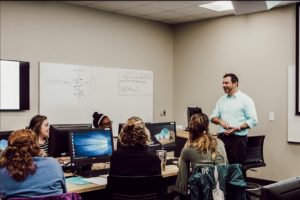
Dr. Ryan Jessup
While in graduate school at Indiana University, Dr. Ryan Jessup collected data to study a theory of decision making that prompted him to conduct this research as a follow-up from that work. As the lead author, Dr. Jessup generated the research idea and designed the experiment which was programmed by Dr. Homer. Levi Ritchie helped program part of the experiment in Python, recruited participants, and collected data before analyzing the data along with Dr. Jessup. The team combined their expertise in their respective fields to compile and edit the paper that was then published in the APA Journal. Dr. Jessup described the goal of their research as, “We wanted to test between multiple competing hypotheses that I had proposed in an earlier paper for the choice overload aka too much choice effect. The effect is that people purchase more when they have fewer options to choose from, violating basic economic principles.”

Levi Ritchie (’15)
The science of cognitive psychology is broad and contains a variety of potential research studies; however, Levi Ritchie described the importance of studying the choice overload effect as essential to the business field, “From a business perspective, understanding the elements that moderate the effect is crucial to marketing. Even when your selection of alternatives is plentiful, it may be beneficial to only present the strongest subset.” Similarly, Dr. Jessup commented on how important the understanding of this effect is when selling or promoting a product, as well as for personal decision making.
“An interesting thing about conducting quality research is that it makes us better at teaching. In my case, it is particularly true because I tend to teach courses on how to conduct or analyze research. But, even if I were teaching a different type of course it would still improve my teaching for several reasons. First, when teaching on a relevant topic, I would be far more aware of the pioneering research – in some cases because I would have been the one to do it; in other cases, it would be because I had to examine all possible theories and explanations when conducting my research, simultaneously giving far more breadth and depth than I would have gotten had I just read about it in the textbook or merely just read a few things about it. In essence, researchers know more about these findings because they are the ones making them – we are not merely reading about them. It is the ultimate in experiential learning”, Jessup said.
The conclusion of this research was explained in-depth in their publication, but Jessup summarized by saying, “We found that one of our proposed explanations well predicted the data whereas another one – the one that is commonly espoused as causing the effect – did not appear to play a role. A specific conclusion was time pressure appears to really drive the effect; so, if you are trying to sell things to people who are often hurried – think drive-thru’s or situations where people often have little children with them – you are better off giving them a very small set of options.”
Levi Ritchie is currently pursuing a career in Data Science, while Dr. Jessup continues to work on research on an improved theory of decision making that combines choice with learning. He is currently working on another project that involves the choices of married individuals and economic games with professors Katie Wick, John Homer and, recently graduated marketing major, Luke Stevens (’20).
 written by special contributor Lance Fleming
written by special contributor Lance Fleming We have been highlighting each of those seven individuals over the last few weeks, including this profile of Ben Blackmon. A native of Allen, Texas, Ben recently graduated from ACU with a degree in Digital Entertainment Technology (DET) and a minor in Bible. He will be attending Guildhall SMU in the fall, a graduate program designed for video game development where he will be part of the level design track.
We have been highlighting each of those seven individuals over the last few weeks, including this profile of Ben Blackmon. A native of Allen, Texas, Ben recently graduated from ACU with a degree in Digital Entertainment Technology (DET) and a minor in Bible. He will be attending Guildhall SMU in the fall, a graduate program designed for video game development where he will be part of the level design track. While at ACU, Garrett has been heavily involved in academic and campus life pursuits. He has served as Dr. James Prather’s research assistant, researching metacognition, programming error messages, and novice programmers. Seven of his articles have been published on various platforms over the last three years.
While at ACU, Garrett has been heavily involved in academic and campus life pursuits. He has served as Dr. James Prather’s research assistant, researching metacognition, programming error messages, and novice programmers. Seven of his articles have been published on various platforms over the last three years.
 first year as the Professional Development and Internship Director for COBA. “Students have the distinct opportunity to apply what can feel like abstract theories and case studies to the real world. Internships are insulated and allow students to practice in an environment designed for them to ask questions and fail, whereas, post-graduate opportunities can be far less forgiving.”
first year as the Professional Development and Internship Director for COBA. “Students have the distinct opportunity to apply what can feel like abstract theories and case studies to the real world. Internships are insulated and allow students to practice in an environment designed for them to ask questions and fail, whereas, post-graduate opportunities can be far less forgiving.”
 said. “Doing so will allow them to fully immerse themselves so they can determine whether or not their dream industry aligns with their values, work style, etc.”
said. “Doing so will allow them to fully immerse themselves so they can determine whether or not their dream industry aligns with their values, work style, etc.” Written by special contributor Lance Fleming
Written by special contributor Lance Fleming Around July 1 when her boss returned from Uvalde, Davis was assigned a new responsibility to create short training videos for both new and regular clients to watch and learn how to use the FDLIC streaming product. Despite the difficult and emotional circumstances, Davis had quickly made a name for herself at the company. So much so that at the end of her apprenticeship, Davis was awarded the Performance Plus Award, which is awarded by the FDLIC’s Board of Directors and had never before been presented to an apprentice.
Around July 1 when her boss returned from Uvalde, Davis was assigned a new responsibility to create short training videos for both new and regular clients to watch and learn how to use the FDLIC streaming product. Despite the difficult and emotional circumstances, Davis had quickly made a name for herself at the company. So much so that at the end of her apprenticeship, Davis was awarded the Performance Plus Award, which is awarded by the FDLIC’s Board of Directors and had never before been presented to an apprentice. was on the job for two months and will have a full-time job waiting for her when she graduates. In the meantime, she was offered a part-time job when the apprenticeship was over and she’s currently working in that job until she can begin her full-time job. And after some time there, her goal is to pursue a career with her DET degree because her true passion is video game design.
was on the job for two months and will have a full-time job waiting for her when she graduates. In the meantime, she was offered a part-time job when the apprenticeship was over and she’s currently working in that job until she can begin her full-time job. And after some time there, her goal is to pursue a career with her DET degree because her true passion is video game design.
